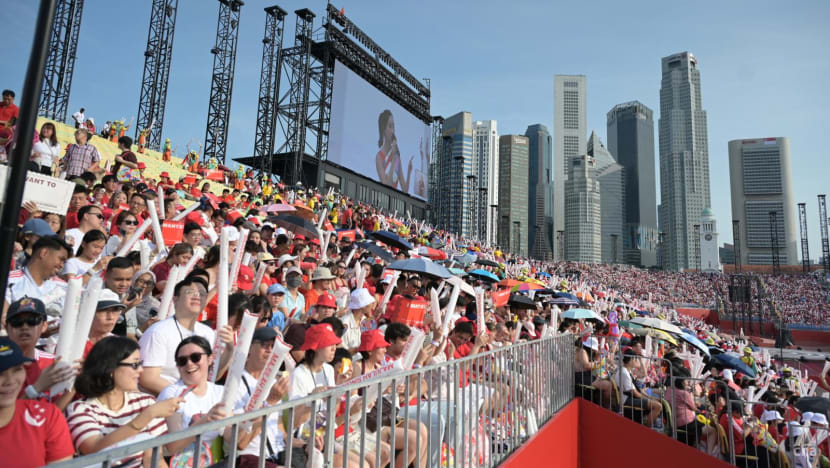Commentary: At SG60, it’s time to move from a ‘me’ to ‘we’ society
SG60 is an invitation for Singaporeans to come together and participate in the community, say Nicholas Thomas and Justin Lee of the Institute of Policy Studies.

The audience at one of NDP 2025's preview shows. (File photo: CNA/Syamil Sapari)

This audio is generated by an AI tool.
SINGAPORE: Singapore will celebrate its 60th birthday tomorrow. While SG60 is a time of celebration, Prime Minister Lawrence Wong has also called it “an opportunity for us to renew our commitment to Singapore.”
Singapore has made important strides in partnering citizens. Recent policy shifts echo S Rajaratnam’s vision of a “democracy of deeds”, where citizens partner with one another and the government to resolve issues and shape the future together.
To build on this momentum and realise a democracy of deeds, we must deepen participation in lasting, inclusive and shared ways.
CITIZENS AS CO-CREATORS IN POLICYMAKING
While initiatives such as feedback unit REACH have made strides in citizen engagement, the government could go beyond consulting citizens to regarding them as partners in policymaking processes.
This means involving them not only in giving feedback but in setting agendas, identifying problems and testing solutions. For example, expanding participatory budgeting at the town level on specific projects – following models in cities like New York, Chengdu and Sao Paulo – could empower residents to influence local spending and priorities, fostering a sense of rootedness and belonging.
Building on programmes like HDB’s Build-a-Playground, where residents contribute to designing neighbourhood playgrounds, citizens can also take greater roles in developing the estates they want to live in.
MULTI-STAKEHOLDER PARTNERSHIPS
Given the complexity of today’s challenges – climate change, misinformation and an ageing population – collaborative partnerships are needed now more than ever. These challenges require a multi-sector approach.
Governance could evolve to include businesses, civil society and academia working as equal partners. Each contributes unique strengths. Businesses bring innovation and resources, civil society offers advocacy and connections to communities, and academia provides research and facilitation.
Philanthropic organisations such as The Majurity Trust and Temasek Foundation support emerging non-profit groups, such as those dedicated to helping vulnerable youths. Academic institutions like the Institute of Policy Studies (IPS) can serve as civic laboratories to test different citizen deliberation models, and community groups like M3 convene dialogues that bridge diverse stakeholders.
Government initiatives can be complemented by a vibrant, citizen-led ecosystem. Providing funding, training and recognition for grassroots projects – while avoiding heavy-handed oversight – enables sustainable, community-driven solutions.
Government efforts such as the SG Eco Fund, a S$50 million grant for ground-up initiatives to promote sustainability, and the Singapore Government Partnerships Office, launched in 2024 for people to find volunteer opportunities and share proposals, help citizens turn ideas into action. Complementing these, BAGUS Together, a 3P (people-private-public) partnership platform, provides resources for budding changemakers.
However, citizens must actively embrace opportunities to be contributors and changemakers to make full use of these efforts.
SHARED ASPIRATIONS
These priorities are critical because Singaporeans increasingly seek not just to be consulted, but to be part of the decisions that shape their lives. The May incident in Tiong Bahru, where residents raised concerns over plans to repaint 14 HDB blocks purple, was turned into a moment of citizen participation.
MP Foo Cexiang’s decision to initiate townhalls and a community vote turned discontent into dialogue. This affirms that legitimacy today can be enhanced through active listening, deliberation, and shared decision-making.
This incident is more than a local-level issue. It reflects a maturing democracy, where decisions made with citizens are stronger than those made for them.
This ethos of citizen participation transcends party lines. During the General Election, opposition candidates also championed townhalls and deliberative platforms. Though formats vary, the consensus is clear: Deliberation grounded in citizens’ lived reality strengthens policy legitimacy and signals a shared political aspiration.
WHAT KIND OF SOCIETY WILL WE BUILD?
As Prime Minister Wong mentioned at IPS’ 35th Anniversary Conference, the refreshed social compact is less about “I, me, and mine”, and more about “we, us, and ours”. Realising this vision demands that the government lead with openness, institutions remain adaptable and citizens embrace their role in shaping the future.
SG60 is a call for all of us to unite; an invitation to lead a project or participate in the community – online, physically, or even via a survey on how you may feel about a situation.
What matters, ultimately, is that we begin.
A “we” society cannot be delivered by government alone. It must be built by all of us. This is a choice each of us can make. The question now is not what the government will do, but what kind of “we” society we will craft together.
Nicholas Thomas is research fellow at the Institute of Policy Studies (IPS), and Justin Lee is the head of IPS Policy Lab, Lee Kuan Yew School of Public Policy, National University of Singapore.
















